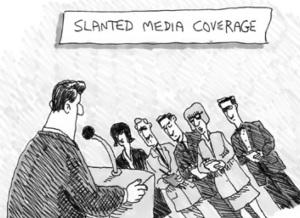
I regularly give science communication workshops that include tips for dealing with reporters and journalists in the mass media. Most of these tips come from my own experience, or from stories I’ve heard from close colleagues. Instead of just teaching these important lessons to a select few who get to hear about them in person, I’ve decided to write a little post listing the most important points. Most of the following has little to do with maximising the likelihood of getting an interview, but these tips should help you avoid problems should a reporter notice your important work.
Welcome to the jungle.
1. The best way to get noticed by the media is to write a press release, although this is no guarantee in itself that anyone will pay attention. A good rule of thumb is to write a release for nearly every peer-reviewed article you publish, even if you think no one will be that interested. You’d be surprised how seemingly innocuous and run-of-the-mill papers can go viral if the press release is well-written. On that latter point, engage closely with your institution’s media office, and help them write the release by, for example, sending them a link to the lucid blog post you wrote about your own paper.
2. You can maximise the probability of uptake of your press release if you foster good working relationships with journalists. If you’ve ever had positive interactions with some before, keep the names on record and send a pre-release version of the article and the press release itself before the main event. Every journalist loves a scoop.
3. Register on expert media sites so that journalists can find you (e.g., like Scimex, Expert Guide, Ocean Expert, etc.). Most countries have such things.
4. If a journalist contacts you, make sure you respond immediately. Often even 30 minutes is too long before they seek opinions from some other scientist. If you are travelling, make sure you have an emergency contact auto-responder designed specifically for deadline-enslaved journalists.

Remember, you’re smarter than they are (© Monty Python)
5. Once you do manage to gain an interview, whether it is live radio, recorded television or just as a chat for a newspaper article, avoid jargon like the plague. And make sure you test your language on a non-expert — what’s jargon to a non-specialist might not appear to be jargon at all to you. This often comes with experience, but at the very least try to avoid big, technical-sounding words (they do not make you sound more intelligent; rather, they make you sound boring and up-yourself).
6. Still on the issue of language, use short, punchy answers, analogies and a little humour. Try to relax (again, this comes with experience) by remembering that you know your shit more than 99.99% of the people that will be listening to you.

3-floor lift rule
7. The 3-floor lift rule: If you cannot explain what you discovered, why it’s important, and what aspect of life it might change within the time it takes a lift to move between three floors, you will not do well in an interview.
8. There are no stupid questions (well, yes there are, but …). You will often be asked the most inane things about your subject; if you are, don’t wince, shake your head or raise an eyebrow. Just answer the question politely and move on.
9. Do NOT make anything up! If you don’t know an answer, just say so. Stick to your story.
10. If the interviewer is struggling to ask relevant, important questions, perhaps suggest a few that they could ask. If it’s not a live interview, you’ll often find that the journalist is happy and relieved to receive the advice.
11. Absolutely NOTHING is off-record. I mean it. Even if they say it is, and they swear up and down that your private comments will remain private, always assume that it’s in the public domain.

13. If the interviewer tries to lead you down a path you don’t want to walk, then don’t. Stick to your main message and don’t take the bait. If you have agreed to be interviewed by a tabloid or politically motivated medium, then expect to be manipulated. A good (tabloid) reporter is very experienced at trying to make you say things you’ll regret.
14. In reference to the point above, expect to be misquoted, misrepresented, or just plain misunderstood. It happens. Don’t let it get to you.
15. Once the interview has terminated, ask to see a transcript prior to publication if possible. I’d say it works only about 50% of the time, but if the journalist is good and wants to write something factual, she’ll often appreciate a quick edit prior to submission to the editor. At the very least, ask for the URL to the online version (or podcast if it’s an interview) so that you can have a record of the event.

